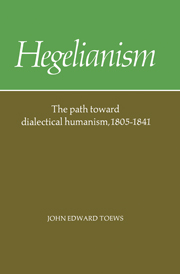Book contents
- Frontmatter
- Contents
- Preface
- Introduction: the Hegelian project in ideological perspective
- PART I PHILOSOPHY AND CULTURAL INTEGRATION: HEGEL IN CONTEXT
- PART II THE HISTORICAL APPROPRIATION OF THE ABSOLUTE: UNITY AND DIVERSITY IN THE HEGELIAN SCHOOL, 1805–1831
- 4 Hegel and Hegelianism: disciples and sympathizers in the formation of the Hegelian school
- 5 Hegelian politics during the Restoration: accommodation, critique, and historical transcendence
- 6 Christian religion and Hegelian philosophy during the Restoration: accommodation, critique, and historical transcendence
- PART III THE REDUCTION OF THE ABSOLUTE TO “MAN”: THE DIVISION OF THE SCHOOL AND THE EMERGENCE OF THE HEGELIAN LEFT, 1830–1841
- EPILOGUE: BEYOND “MAN” – THE RISE AND FALL OF LEFT HEGELIAN HUMANISM
- Notes
- Bibliography
- Index
5 - Hegelian politics during the Restoration: accommodation, critique, and historical transcendence
Published online by Cambridge University Press: 08 January 2010
- Frontmatter
- Contents
- Preface
- Introduction: the Hegelian project in ideological perspective
- PART I PHILOSOPHY AND CULTURAL INTEGRATION: HEGEL IN CONTEXT
- PART II THE HISTORICAL APPROPRIATION OF THE ABSOLUTE: UNITY AND DIVERSITY IN THE HEGELIAN SCHOOL, 1805–1831
- 4 Hegel and Hegelianism: disciples and sympathizers in the formation of the Hegelian school
- 5 Hegelian politics during the Restoration: accommodation, critique, and historical transcendence
- 6 Christian religion and Hegelian philosophy during the Restoration: accommodation, critique, and historical transcendence
- PART III THE REDUCTION OF THE ABSOLUTE TO “MAN”: THE DIVISION OF THE SCHOOL AND THE EMERGENCE OF THE HEGELIAN LEFT, 1830–1841
- EPILOGUE: BEYOND “MAN” – THE RISE AND FALL OF LEFT HEGELIAN HUMANISM
- Notes
- Bibliography
- Index
Summary
We now have monks of Atheism, whom Mr. Voltaire, because he was an obstinate Deist, would have broiled alive. I must admit that this music does not appeal to me, but it does not frighten me either, for I have stood behind the Maestro while he composed. To be sure, he composed with indistinct and elaborately adorned notes – so that not everyone could decipher them. Occasionally I observed how he anxiously looked about in fear that he might have been understood. He liked me very much because he was convinced that I would not betray him; I even thought him servile at that time. Once, when I expressed displeasure with the phrase ‘Everything that is, is rational,’ he smiled strangely and said, “One could also read it as ‘everything which is rational must be.’” He quickly looked about, but soon regained his composure.
… for Hegel was a man of character. And though, like Schelling, he bestowed on the existing order of church and state some all too dubious vindications, he did so for a state that, in theory at least, does homage to the principle of progress, and for a church that regards the principle of free inquiry as its vital element.
I could easily prophecy which songs would one day be whistled and trilled in Germany, for I was present at the hatching of the birds that later intoned the new music. I saw how Hegel, with his almost comically serious countenance, sat like a brood-hen on the fatal eggs, and I heard his cackling.
- Type
- Chapter
- Information
- HegelianismThe Path Toward Dialectical Humanism, 1805–1841, pp. 95 - 140Publisher: Cambridge University PressPrint publication year: 1981



